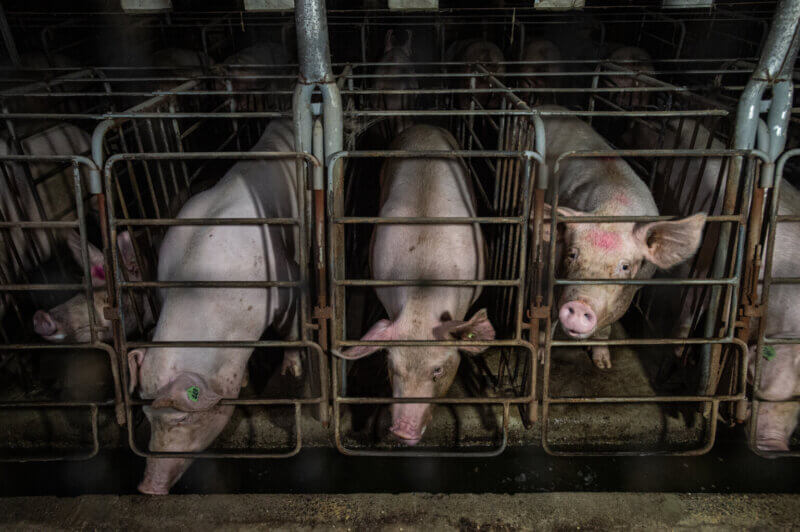Andaman and Nicobar Islands Order Major Animal Welfare Reforms Following PETA India Appeals
Following appeals from PETA India, the Directorate of Animal Husbandry and Veterinary Services, Andaman and Nicobar Administration, issued circulars prohibiting the manufacture, sale, and use of gestation and farrowing crates in pig farming as well as of deadly glue traps for rodent control. The circulars also urge residents to make themselves aware of the provisions of The Prevention of Cruelty to Animals Act, 1960, and to take an active part in alleviating animal suffering.
Gestation crates (aka “sow stalls”) are metal cages essentially the size of a pig, with concrete or slatted floors, that leave the animals unable to turn around or even stand up without difficulty. They’re used to confine pregnant pigs, who are typically transferred to farrowing crates to give birth and are kept in them until their piglets are taken away. Farrowing crates are fundamentally the same as gestation crates, except that they contain small side compartments for piglets.
These crates deny mother pigs everything that’s natural and important to them, such as opportunities to forage, build a nest for their young, socialise with other pigs, and regulate their body temperature (such as by wallowing in mud). The extreme stress and frustration caused by this severe confinement results in abnormal behaviour, such as continually biting at the enclosure bars or “chewing” the air.
Glue traps are usually made of plastic trays or sheets of cardboard covered with strong glue and are indiscriminate killers, often catching non-target animals – including birds, squirrels, reptiles, and frogs. Mice, rats, and other animals caught in these traps can die of hunger, dehydration, or exposure after days of prolonged suffering. Others may suffocate when their noses and mouths become stuck in the glue, while some even chew through their legs in a desperate bid for freedom and die from blood loss. Those found alive may be thrown away along with the trap or may face an even more traumatic death, such as by bludgeoning or drowning.
This is why glue traps are cruel for rats.#PETAIndia pic.twitter.com/Hcjimgqk6u
— PETA India (@PetaIndia) June 28, 2021
The best way to control rodent populations is to make the area unattractive or inaccessible to them. Eliminate food sources by keeping surfaces and floors clean, storing food in chew-proof containers, sealing trash cans, and using ammonia-soaked cotton balls or rags to drive rodents away (they hate the smell). After giving them a few days to leave, seal entry points using foam sealant, steel wool, hardware cloth, or metal flashing. Rodents can also be removed using humane cage traps but must be released where they will find adequate food, water, and shelter to help them survive.
In September, following an appeal from PETA India, the Andaman and Nicobar Directorate of Animal Husbandry and Veterinary Services directed all zonal officers and senior veterinary officers to prohibit the sale, manufacture, and trade of illegal spiked bits, which are used to control horses. District societies for the prevention of cruelty to animals and the superintendent of police are among those copied into the circular. Spiked bits sink deep into horses’ mouths and cut their lips and tongues, causing extreme pain and lifelong damage.








